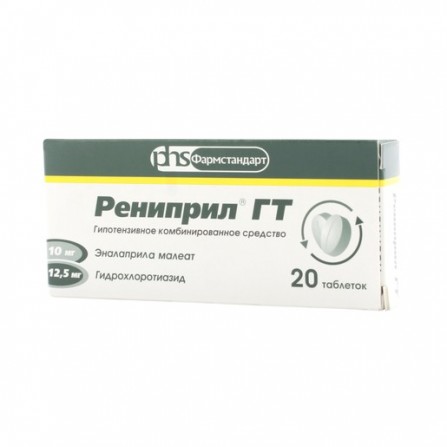More info
Active ingredients
Hydrochlorothiazide + Enalapril
Release form
Pills
Composition
enalapril maleate 10 mg.
Pharmacological effect
Antihypertensive drug, ACE inhibitor. The mechanism of action of enalapril is associated with inhibition of ACE activity, which reduces the formation of angiotensin II, which contributes to the narrowing of blood vessels, and simultaneously activates the formation of kinins and prostacyclin, which have vasodilating action. Enalapril belongs to prodrugs, after its hydrolysis enalaprilat is formed in the body, which inhibits this enzyme. Enalapril also has some diuretic effect associated with moderate inhibition of aldosterone synthesis. Along with a decrease in blood pressure, the drug reduces the pre- and afterload on the myocardium in heart failure, improves blood circulation in the small circle and respiratory function, reduces resistance in the kidney vessels, which helps normalize blood circulation in them.
Pharmacokinetics
After ingestion, the absorption is 60%. Food intake does not affect absorption. In the liver undergoes metabolism with the formation of the active metabolite enalaprilat. Binding to plasma proteins for enalaprilat is 50-60%. C max enalapril is reached after 1 h, enalaprilat after 3-4 h. Enalaprilat does not penetrate through the BBB, in a small amount through the placental barrier and is excreted in small amounts in breast milk. It is excreted by the kidneys (up to 60%, of which 20% is in the form of enalapril and 40% is in the form of enalaprilat) and through the intestine (33%, of which 6% is in the form of enalapril and 27% in the form of enalaprilat).
Indications
- various forms of arterial hypertension (including renovascular); - chronic heart failure (as part of combination therapy).
Contraindications
- angioedema associated with the use of ACE inhibitors (in history); - progressive azotemia in bilateral stenosis of the renal arteries or stenosis of the artery of the only kidney; - childhood; - pregnancy; - lactation (breastfeeding); - hypersensitivity to enalapril and other components - hypersensitivity to other ACE inhibitors.
Precautionary measures
Do not exceed the recommended daily dose.
Use during pregnancy and lactation
Renipril is contraindicated during pregnancy and lactation.
Dosage and administration
Renipril is prescribed orally regardless of food intake. When treating essential hypertension, the initial dose of Renipril is 10-20 mg / day. In the future, the dose is selected individually. In moderate hypertension, a dose of 10 mg / day is sufficient. The maximum daily dose is 80 mg. In Renovascular hypertension, Renipril is prescribed in smaller doses. The initial dose is usually 5 mg / day, then the dose is selected individually. The maximum dose is 20 mg / day. In case of heart failure, Renipril is prescribed starting from 2.5 mg, then the dose is gradually increased to 10-20 mg (1-2 times / day). The duration of treatment depends on the effectiveness of the therapy. In all cases, when too severe lowering the blood pressure dose of the drug is gradually reduced. The drug is used both in monotherapy and in combination with other antihypertensive drugs. In patients with impaired renal function, reduce the single dose or increase the intervals between doses.
Side effects
From the side of the central nervous system and peripheral nervous system: dizziness, headache, feeling of fatigue are possible. From the cardiovascular system: arterial hypotension, orthostatic hypotension are possible. From the alimentary system: nausea, increased serum hepatic transaminase activity are possible; rarely - vomiting, diarrhea. Allergic reactions: rarely - skin rash, angioedema. From the urinary system: an increase in urea, creatinine. From the respiratory system: a dry cough is possible. From the hematopoietic system: rarely - anemia, thrombocytopenia, leukopenia, agranulocytosis. Others: muscle cramps are possible. Side reactions are usually mild and transient and usually do not require discontinuation of the drug.
Overdose
Symptoms: hypotension. Treatment: put the patient in a position with raised legs. In mild cases, appoint saline solution. In more severe cases, in a hospital setting, measures are taken to stabilize blood pressure: IV injection of saline or plasma substitutes. Perhaps the use of hemodialysis.
Interaction with other drugs
With the simultaneous appointment of Renipril and NSAIDs may decrease the effectiveness of Renipril; with potassium-sparing diuretics (spironolactone, triamterene, amiloride) - hyperkalemia may develop; with lithium salts - slow lithium elimination (control of lithium concentration in blood plasma is shown). When used simultaneously with antipyretic analgesics, the effectiveness of Renipril may be reduced. Reniril weakens the effect of drugs containing theophylline. adrenergic blockers, methyldopa, nitrates, calcium channel blockers, hydralazine, prazosin enhances the hypotensive effect. Ethanol enhances the antihypertensive effect of pre Arata.
special instructions
With extreme caution should use the drug in patients with autoimmune diseases, impaired liver or kidney function, with the loss of fluids and salts, simultaneously with immunosuppressants and diuretics. In the case of previous treatment with diuretics, in particular in chronic heart failure, Renipril increases the risk of arterial hypotension, therefore, before starting treatment with Renipril, it is necessary to compensate for the loss of fluid and salt. .




